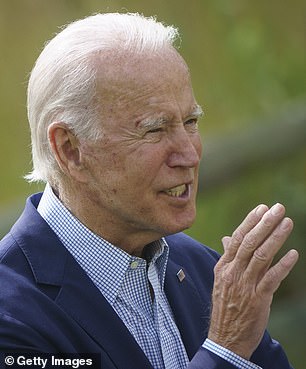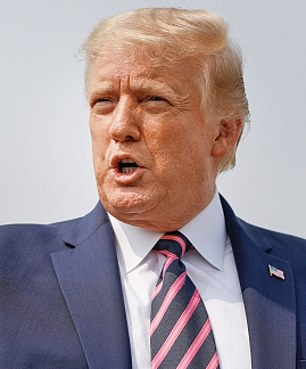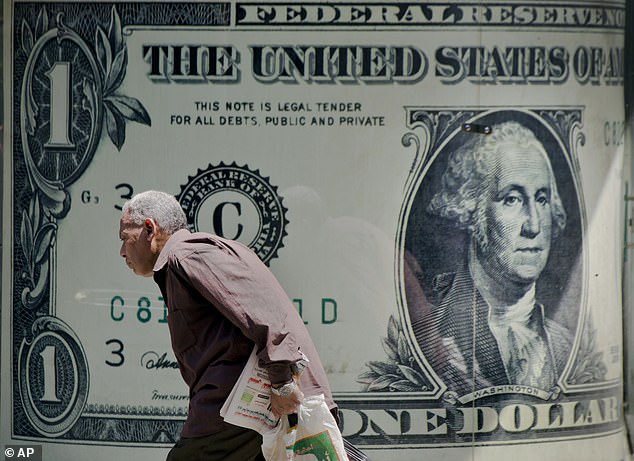Can US economic recovery save Donald Trump? President clashes with Biden in race for the White House
The pandemic delivered the deepest and swiftest American downturn in modern history in the first half of 2020, with unemployment soaring to 22m and output plunging.
As the presidential election campaign enters its final 60 days, the strategy of Democrat candidate Joe Biden is to pin the blame for the cruel economic fallout on Donald Trump’s fumbled and incompetent handling of Covid-19.
There can be no dispute about Trump’s at times farcical handling of the pandemic, from his musing about using disinfectants, to his zig-zagging on masks and the appalling death toll of approaching 200,000.



Democrat candidate Joe Biden, left, and his team is to pin the blame for the cruel economic fallout on Donald Trump’s, right, fumbled and incompetent handling of Covid-19
The Covid response, together with his law and order reaction to the violence in America’s cities, and narcissistic character flaws, gifted Biden a substantial lead in national and battleground state polls coming out of the August conventions.
Yet the polls remarkably show that just under half of voters still see Trump as the candidate best able to deliver on jobs and growth.
His lead on economic competence has narrowed but he scores highly among conservatives who credit him for being a successful businessman and tough negotiator.
Ahead of the pandemic, when the economy was still motoring along, Trump’s approval rating for economic management stood at 63 per cent, according to Gallup.
That fell to 48 per cent in August as moderates, independents and those who had been to university or college deserted. Given the commercial disruption and length of the dole queues one might have expected an even bigger hit.
The willingness to give Trump the benefit of the doubt on the economy could be a serious problem for Biden in swing states which will settle the election.
At the start of September former vice-president Biden looked to be in the driving seat. But the remarkable flexibility and resilience of the US economy already means a sharp bounce back from the dire job losses caused by lockdown and Covid-19.
Unemployment fell from the 22m peak to 13.4m at the end of August, with a further 1.4m citizens returning to the workforce in the last month.
The big question is whether the economic bounce back and improvement in job prospects can continue at the same pace through to November.
Historically, pocket book issues have played a critical role in settling American elections. Franklin D Roosevelt promised to end the Great Depression of the 1930s.


Joe Biden and his allies, such as New York governor Andrew Cuomo, are seeking to cast Trump as the architect of the hardship and misery caused by the pandemic
Jimmy Carter lost the 1980 election to the optimism of Ronald Reagan and George HW Bush senior was beaten by Bill Clinton in 1992. Both losing incumbents went to the polls amid slowdown and rising joblessness.
Trump is in a race against time to show he contributed to a rapid recovery. The Administration’s large $2.2trillion (£1.7trillion) Covid package delivered unprecedented assistance to small and medium sized businesses, brought the airline industry back from the brink and placed a cheque in the hands of every taxpayer.
Trump’s hope has been assisted by the Federal Reserve. When Covid-19 hit, the central bank headed by Jerome Powell fought against market instability and economic scarring.
Rates were lowered, trillions of dollars injected into the markets where financial groups lend to each other and swap lines activated with other central banks to make sure there was no repeat of the financial crisis.
The Fed’s August switch to new average inflation targeting and emphasis on employment should ensure there will be no sudden rise in interest rates to rock recovery. Its change of tack was one factor driving the unusual August Wall Street rally.
Trump has long sought to claim credit for rising stock prices while ignoring the setbacks.
Nevertheless, share ownership in the US through retirement plans and mutual funds is much more widespread than in the UK. This means the Dow, S&P and Nasdaq indexes genuinely matter to voters.
A key theme of Biden’s campaign, reinforced by Black Lives Matter demonstrations, is to focus policies on left-behind citizens.
He wants to expand Obamacare so that 97 per cent of Americans have health coverage, raise the minimum wage to $15 an hour and has a $700million plan to boost manufacturing – much of it to be financed by higher corporate and personal taxes.
This despite the fact that many economists say raising taxes as the US seeks to reclaim output and jobs lost would be madness.
Biden and his allies, such as New York governor Andrew Cuomo, are seeking to cast Trump as the architect of the hardship and misery caused by the pandemic.
They would rather fight on this field than on Trump’s economic record over the previous three years.
One of his unexpected successes is that the US finally overcame the legacy of the financial crisis.
Average workers’ pay grew 3 per cent per year and the number of poorest Americans eligible for food stamps fell to 35.7m, the lowest since 2009.
As the Washington Post said, until the virus hit in February, ‘many Americans rate this as the best economy since the late 1990s’.
The Black unemployment rate fell from 7.5 per cent when Barack Obama left office to 5.4 per cent pre-pandemic. Now it has surged to 13 per cent.
Some of the data is moving in Trump’s direction. Average house prices at $304,100 (£233,846) reached their highest ever level in July 2020.
The two major indexes of consumer confidence peaked before Covid. They have since tanked amid concern about jobs.
Trump still hopes to deliver further stimulus, including tax cuts. But Democrats in the House of Representatives played hardball fearing too large and generous a package could hurt Biden.
As the election looms, bipartisanship over meeting the economic challenge from the pandemic has retreated. Even so, improving economic indicators could still help an unpopular president overhaul the poll lead of his challenger.
